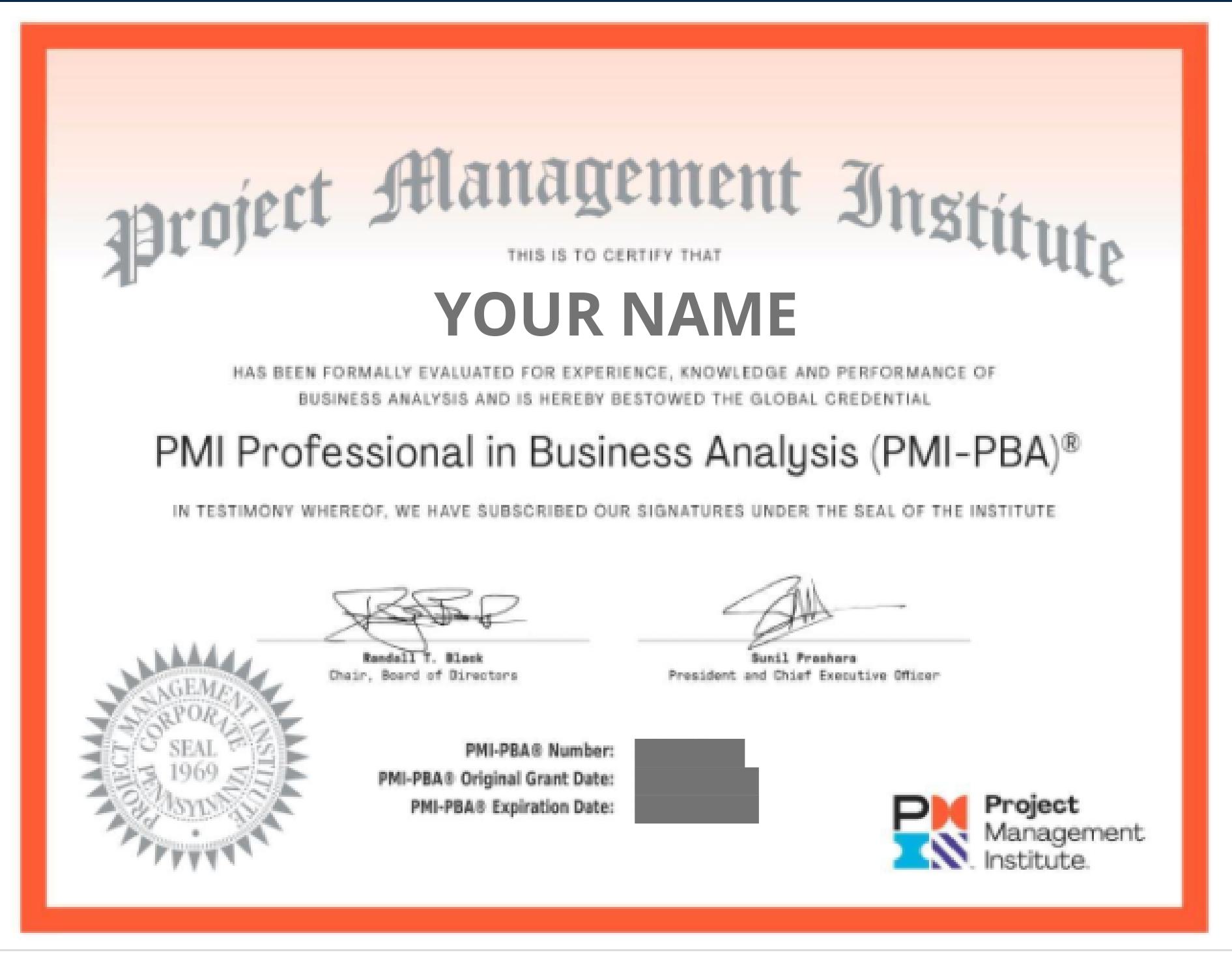Move your career in the right direction.
Shape your project outputs.
Achieve your desired business outcomes.
Business Analyst
System Analyst
Program Manager
Delivery Manager
Project Manager
Product Manager
Product Owner
Domain Specialist
Systems architects or designers
IT managers/directors
QA professionals
Systems testers
Business customers, users, or partners
Anyone wanting to enhance their business analysis skill
Develop the ability to define and interpret Business Benefits
Illustrate skills to engage stakeholders to develop the right solution
Learn approaches to doing business analysis both for a project and for a core business environment.
Illustrate experience in requirement development and management
Build an understanding of approaches to evaluate the solution to see how well the solution meets the business case
Create understanding to maintain the integrity of the requirements and associated artifacts
Enroll in the PMI-PBA® course
Access to our e-learning course, including mock questions
Get the 35 contact hours certificate from us
Start filling out exam applications. Our experts will help you.
Submit application
After the approval, you may submit a fee and schedule and pass the exam.
Illustrate working with business stakeholders to analyze the business problems to develop a high-level solution scope.
Present the Business Case, project goals & objectives to develop a context of planning
Establish a roadmap for delivering the expected solution
Apply collaboration techniques with stakeholders to define business metrics and acceptance criteria
Learn Elicit requirements using individual and group elicitation techniques.
Evaluate product options and capabilities to determine which requirements are accepted, deferred, or rejected.
Learn to track requirements using the Requirement Traceability Matrix.
Present integrity of the requirements and associated artifacts while managing requirement changes
Learn approaches to validate the solution’s test results against the requirements acceptance criteria
Learn decision-making techniques for effective business analysis planning, analysis, requirements tracking, evaluation, and obtaining stakeholder’s sign-off.
60+ hours of classroom-style videos using interactive whiteboard sessions
180 days of E-Learning access
900+ PMI-PBA® exam questions as per PMI-PBA® content outline
2 Full-length simulation exams
Practice questions for each business analysis domain
Practice questions for business analysis tools & techniques and knowledge & skills
PMI-PBA® exam tips & tricks and glossary
Access to a Community of 5000 PMI® professionals to discuss your questions and doubts
An optional one-on-one session with the expert trainer
PMI-PBA® 35 contact hours certificate
Goal-based study approach
Continuous end-to-end support to pass the PMI-PBA® exam on the first attempt. Our expert trainers stay personally connected with you at every step of your PMI-PBA® Certification.
Support in Filling PMI-PBA® Examination Application Form
Easy returns 7 days 100% money-back guarantee
Exclusive forum access where participants can share their learned and practical experiences. The forum is ideal for getting expert tips for the exam.
Support in Filling PMI-PBA® Examination Application Form
| Topics Covered |
|---|
| PMI Professional in Business Analysis (PMI-PBA)® Exam Introductory Guide – Must Read Before You Start |
| Study Plan |
| Study Guideline |
| PMI-PBA® Exam Preparation Discussion |
| What is Business Analysis |
| Business Analysis Domains |
| Business Analysis Practice Guide |
| Topics Covered |
|---|
| Need Assessment |
| Planning |
| Analysis |
| Traceability and Monitoring |
| Evaluation |
| Topics Covered |
|---|
| Introduction |
| The Value of Business Analysis |
| What is Business Analysis |
| Type of Requirements |
| Project Stakeholders |
| Product and Project Life Cycles |
| Program Management |
| Portfolio Management |
| Business Value |
| Components of the PMI Guide to Business Analysis |
| Topics Covered |
|---|
| Enterprise Environment Factors and Organization Process Assets |
| Organization Systems and Business |
| OPM |
| Topics Covered |
|---|
| Role of Business Analyst |
| Business Analyst’s Sphere of Influence |
| Topics Covered |
|---|
| Identify Problem & Opportunity |
| Identify Problem or Opportunity – ITTO |
| Identify Problem or Opportunity – ITTO – Presentation |
| Assess Current State of the Organization |
| Assess Current State – ITTO |
| Assess Current State – ITTO – Presentation |
| Determine Future State – ITTO |
| Determine Future State – ITTO – Presentation |
| Recommend Actions to Address Business Need |
| Determine Viable Options and Provide Recommendation ITTO |
| Determine Viable Options and Provide Recommendation ITTO – Presentation |
| Facilitate Product Roadmap Development ITTO |
| Facilitate Product Roadmap Development ITTO – Presentation |
| Assemble the Business Case |
| Assemble Business Case ITTO |
| Assemble Business Case ITTO – Presentation |
| Support Charter Development ITTO |
| Support Charter Development ITTO – Presentation |
| Need Assessment Exam Tips |
| Quiz |
| Topics Covered |
|---|
| Planning Domain Clarification Session – Part -1 -Presentation |
| Planning Domain Clarification Session – Part -1 -Clarification Session |
| Planning Domain Clarification Session – Part -2 -Presentation |
| Planning Domain Clarification Session – Part -2 -Clarification Session |
| Why Business Analysis Planning |
| Conduct or Refine the Stakeholder Analysis |
| Business Analysis Plan |
| What to include in the Business Analysis Plan |
| Leverage Past Experiences when Planning |
| Plan for Elicitation and Analysis |
| Define the Requirements Prioritization Process |
| Define the Traceability Approach |
| Define the Communication Approach |
| Define the Decision Making Process |
| Define the Requirements Verification & Validation Process |
| Topics Covered |
|---|
| What is Agile? |
| Agile Principles |
| APM Framework |
| Scrum in Action |
| The Product Backlog |
| Product Backlog Management |
| User Stories |
| INVEST User Stories |
| Estimation |
| Discussion on User Stories and Estimation |
| Value Based Prioritization |
| Planning |
| Agile Release Planning |
| Monitoring |
| Retrospective |
| Topics Covered |
|---|
| Identify Stakeholders ITTO |
| Identify Stakeholders ITTO – Presentation |
| Conduct Stakeholder Analysis ITTO |
| Conduct Stakeholder Analysis ITTO – Presentation |
| Determine Elicitation Approach ITTO |
| Determine Stakeholder Engagement and Communication Approach ITTO – Presentation |
| Work Breakdown Structure |
| Conduct Business Analysis Planning ITTO |
| Conduct Business Analysis Planning ITTO – Presentation |
| Prepare for Transition to Future State ITTO |
| Prepare for Transition to Future State ITTO – Presentation |
| Manage Stakeholder Engagement and Communication – ITTO |
| Manage Stakeholder Engagement and Communication – ITTO – Presentation |
| Assess Business Analysis Performance ITTO |
| Assess Business Analysis Performance ITTO – Presentation |
| Topics Covered |
|---|
| Elicit Information |
| Plan for Elicitation |
| Determine Elicitation Approach ITTO |
| Determine Elicitation Approach ITTO – Presentation |
| Prepare for Elicitation |
| Prepare for Elicitation ITTO |
| Prepare for Elicitation ITTO – Presentation |
| Conduct Elicitation Activities |
| Conduct Elicitation ITTO |
| Conduct Elicitation ITTO – Presentation |
| Elicitation Techniques |
| Confirm Elicitation Results ITTO |
| Confirm Elicitation Results ITTO – Presentation |
| Elicitation Issues and Challenges |
| Complete Elicitation |
| Topics Covered |
|---|
| Plan for Analysis |
| Determine Analysis Approach ITTO |
| Determine Analysis Approach ITTO – Presentation |
| Business Analysis Model |
| Create and Analyze Models |
| Scope Models |
| Process Models |
| Rule Models |
| Data Models |
| Interface Models |
| Prioritization Schemes |
| The Product Backlog |
| Document the Solution Requirements |
| Requirements Characteristics |
| Verification and Validation |
| Identify and Analyze Product Risks |
| Identify and Analyze Product Risks – Presentation |
| Assess Product Design Options |
| Assess Product Design Options – Presentation |
| Exam Tips For Analysis Domain |
| Quiz |
| Topics Covered |
|---|
| Requirement Traceability Matrix |
| What is RTM – Basic Idea |
| What is RTM – Presentation |
| Determine Traceability and Monitoring Approach – ITTO |
| Determine Traceability and Monitoring Approach ITTO – Presentation |
| Dependency Management using RTM |
| Establish Relationship and Dependencies ITTO |
| Establish Relationship and Dependencies ITTO – Presentation |
| Work Authorization System |
| Baseline & Monitoring Requirements |
| The Requirements Life Cycle |
| Select and Approve Requirements ITTO |
| Select and Approve Requirements ITTO – Presentation |
| Managing Changes To Requirements |
| Configuration Management System |
| Manage Changes to Requirements and other Product Information ITTO |
| Manage Changes to Requirements and other Product Information ITTO – Presentation |
| Exam Tips For Traceability and Monitoring Domain |
| Quiz |
| Topics Covered |
|---|
| Solution Evaluation |
| Evaluate Solution Performance ITTO |
| Evaluate Solution Performance ITTO – Presentation |
| Plan for Evaluation |
| Determine What to Evaluate |
| When and how to Validate Solution Results |
| Determine Solution Evaluation Approach ITTO |
| Determine Solution Evaluation Approach ITTO – Presentation |
| Evaluate Acceptance Results and Address Defects ITTO |
| Evaluate Acceptance Results and Address Defects ITTO – Presentation |
| Defects Go/No-Go Signoff |
| Obtain Solution Acceptance for Release ITTO |
| Obtain Solution Acceptance for Release ITTO – Presentation |
| Exam Tips For Evaluation Domain |
| Quiz |
| Topics Covered |
|---|
| Role of BA in Need Assessment |
| Strategy Development & Refinement |
| Mission Objectives Strategies and Tactics |
| PESTLE Analysis |
| Porter’s Five Forces Framework |
| BCG Matrix |
| Resource Audit |
| SWOT |
| Ansoff Matrix |
| McKinsey 7S Model |
| Four View Model |
| Business Rule |
| CATWOE |
| Financial Decision Analysis (NPV , PV etc.) |
| Value Stream Mapping |
| Topics Covered |
|---|
| Interview |
| Presentation: Interview |
| Interview Question Type |
| Workshop |
| Brainstorming |
| Focus Group |
| Observation |
| Quantitative Investigation |
| Questionnaire |
| Persona |
| Context Diagram |
| Mind Map |
| Rich Pictures |
| RACI, RASCI |
| Decision Table |
| Force Field Analysis |
| Acceptance Criteria Definition |
| Benchmarking |
| Presentation : Root Cause Analysis |
| Presentation: Interface Analysis |
| Presentation : Lesson Learned |
| Presentation : Brainstorming |
| Presentation : Pareto |
| Kano Model |
| Presentation : Functional Decomposition |
| Presentation : Document Analysis |
| Data Dictionary & Glossary |
| Conflict Management |
| Estimation |
| Presentation : Use Cases |
| Presentation : Sequence Diagram |
| Prioritization & Decision Making: MoSCow |
| Decision Tree and Expected Monitory Value |
| Topics Covered |
|---|
| Introduction of PMBOK® Guide Edition |
| Project Integration Management |
| Project Scope Management |
| Economic Models of Project Selections |
| Project Quality Management |
| Project Communication Management |
| Project Risk Management |
| Project Stakeholder Management |
| Topics Covered |
|---|
| Agile Mind-set |
| Lean Kanban Agile |
| Project Life cycle |
| Stacey Complexity Model |
| Characteristic of Project Life cycle |
| Hybrid Life Cycle |
| Agile Adaption Strategies |
| Tailoring Options |
| Start with an agile mind-set |
| Servant leadership empowers the team |
| Servant leader responsibilities |
| Role of The Project Manager In an Agile Environment |
| Agile Teams |
| Agile Roles |
| Generalizing Specialists |
| Team Structures |
| Dedicated Team Members |
| Team Workspaces |
| Overcoming Organizational Silos |
| Charter the Project and the Team |
| Common Agile Practices -Retrospectives |
| Common Agile Practices – Backlog Preparation |
| Organizational Change Management |
| Organizational Culture |
| Procurement and Contracts |
| Business Practices |
| Multiteam Coordination and Dependencies (Scaling) |
| AGILE Project Management Office |
| Organization Structure |
| Topics Covered |
|---|
| Eligibility Requirements |
| Exam Process |
| Examination Information |
““PMI-PBA®️ spotlight your valuable skills in shaping project outputs and driving intended business outcomes””


Premium Authorized Training Partner of PMI (PMI ATP)

Best PMP-PBA® online Training Material to pass the exam in the shortest possible time

Trained instructors to support you end to end whenever you need

Mentored professionals across 30+ countries

1000+ Informational videos on our YouTube channel

55,000+ subscribers are getting the benefit

Query Handling Facility over Email and Phone

Continuous Support Through dedicated Forum

500+ enrollments every month

Dedicated Customer Support for PMI® Membership
Business analysis is the application of knowledge, skills, tools, and techniques to:
In short, business analysis is the set of activities performed to identify business needs and recommend relevant solutions; and elicit, document, and manage requirements.
Source: Project Management Institute. Business Analysis for Practitioners: A Practice Guide, 2015. Page 3.
You can also refer to the following video to understand the high-level view of Business Analysis activities https://www.youtube.com/watch?v=BS4cUJ9V0wA
PMI-PBA® certification is an accredited PMI Professional in Business Analysis (PMI-PBA)®
Certification. PMI defines business analysis as applying knowledge, skills, tools, and techniques.
While managing requirements is one critical part of the larger business analysis function, the business analysis process often begins before project initiation and extends beyond project closure to ensure that expected benefits are realized.
Whether a project manager or business analyst is responsible, being good at these related functions is essential to ensure the successful delivery of projects and programs.
Source: PMI-Pulse-Requirements-Management-In-Depth-Report
Any professional who works on projects and programs, including project and program managers, who perform business analysis in their role:
The cost of the PMI-PBA (Professional in Business Analysis) exam varies by country. To obtain detailed information on the exam cost for India and the United States, please refer to our dedicated FAQs for these regions. For candidates from other countries looking for specific pricing information, we recommend contacting iZenBridge directly by emailing sales@izenbridge.com. This ensures that you receive accurate and up-to-date information regarding the exam costs applicable to your location.
If you’re aiming for the PMI-PBA certification in India, here’s a comprehensive overview of the costs involved:
For PMI Members in India:
Annual Membership Fee (Including GST): ₹11,611.20
PMI-PBA Exam Fee (Including 18% GST): ₹27,479.84
Total Cost (Exam and Membership Fees, Including GST): ₹39,091.04
For Non-Members in India:
PMI-PBA Exam Fee (Including 18% GST): ₹53,701.80
For USA PMI-PBA exam aspirants, the costs of the PMI-PBA exam are as follows:
PMI Members:
Membership Fee: $149
Exam Fee: $405
Combined Total: $554
Non-Members:
Exam Fee: $555
No, Business analyst designation is not a mandate for PMI-PBA® Certification. PMI recognizes if you are a part of business analysis, irrespective of your designation. You may be a system engineer or a project manager, but if your work activities are as per the content outline of the PMI-PBA® certification, this then makes you eligible for this certificate.
No, you don’t need any PMI Certification as a prerequisite for PMI-PBA® Certification.
The eligibility criterion of PMI-PBA® certification is grouped under two types:
PMI has grouped business analysis activities under five domains:
You can check the details in the PMI-PBA® Certification Content Outline
Yes, if you currently hold a Project Manager Position, you are still eligible for this certification. You can show your business analysis activities for each domain as a Project Manager. PMI-PBA® Certification just needs business analysis experience regardless of designation. Anyone who works on projects and programs and project and program managers who perform business analysis as part of their role can apply for this certification.
For more details on understanding your eligibility as a project manager – Why Should Project Manager Get PMI-PBA® Certification?
You need to have 35 contact hours of business analysis education. This education you can take from any registered education provider following PMI-PBA® Certification Content Outline
The centers authorized to take exams for PMP® can also take exams for PMI-PBA® Exam. Centers conducting the exam for a Certified Associate in Project Management (CAPM)® or Agile Certified Practitioner (PMI-ACP)® may not conduct this exam.
Four hours duration for 200 questions
PMI has released Business Analysis for Practitioners: A Practice Guide and PMI Guide to Business Analysis and PMI guide to Business Analysis.
PMI has also suggested a few reference books, which you can go through based on the PMI-PBA® Exam Content Outline.
PMI-PBA is a registered trademark of the Project Management Institute, Inc.
PMP and PMBOK have registered trademarks of the Project Management Institute, Inc.


Seema Sonkiya having approx. 13 years of experience in Scrum, Extreme Programming, lean, and others that fall under the Agile umbrella. She also has good exposure in busine...
Head Office: 526, Vipul Trade Center, Sector 48, Sohna Road, Gurgaon.
Training: (+91) 9958287711 | sales@izenbridge.com
Write a Review